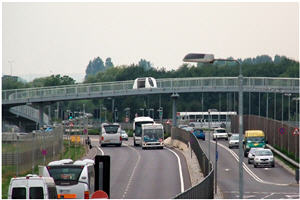Podcars inch from myth to reality

Personal rapid transit (PRT) has seen its fair share of political strife and skepticism, particularly in the U.S. where a few projects are stuck at the planning stage. But this novel way of getting around appears to have a good shot at flourishing overseas.
Two PRT systems in development are on the brink of large-scale testing and deployment. One of them is in Masdar City, a futuristic urban development in the United Arab Emirates, while the other is at Heathrow International Airport, near London. Both demonstrate that with the right applications, technology and funding, PRT can be an attractive alternative to other forms of mass transit.
PRT systems offer on-demand, driverless private vehicles (usually seat four to six passengers) that run on a network of sensors, not rails, providing non-stop transportation. (How these generally work was covered in this blog a few years back).
The system at Heathrow, called ULTra is being built by Advanced Transport Systems, based in Bristol, UK. According to the company, recent progress includes the completion of the guideway phase of construction, which includes an Automatic Vehicle Protection (AVP) system that’s similar to those used in the rail industry. The operators expect the system to open to airport users later this year.
A Dutch company, 2getthere, is building the system in Masdar , and their approach is similar but with a few differences, such as more-advanced batteries made of lithium iron phosphate (ULTra uses lead-acid). The podcar network will be larger and have more traffic as it's an integral component of the zero-carbon city, and was part of the plan from the ground up.
A recent article in Technology Review compares both PRT implementations, while details of the system in Masdar City and an interview with one of the city's designers is available at Treehugger.
Credit: Masdar
Podcar Politics
Supporters of PRT say that the systems combine the convenience and privacy of a car with the environmental benefits of mass transit. Many opponents think that cost-effective PRT is a myth since the traffic, actual or potential, may not justify it.
In a PR release last December about the global emergence of PRT systems, consulting firm Frost & Sullivan said, "Today we are seeing a huge growth phase of European Transportation and we will continue to see this growth in the coming future; especially in traffic management and passenger flow transport systems." They made no mention of any progress specific to the U.S., which ironically is the home of the first operational PRT system dating back to the mid-70's in Morgantown, West Virginia.
In the U.S. personal transit innovation exists, but it runs on age-old infrastructure. So we have hybrid and electric cars, shared vehicle services like Zipcar or City Car Share, and, well, Segway, to point to as signs of recent progress.
If successful in the U.K. and UAE, will personal rapid transit spread to other cities? Add your opinion below.
